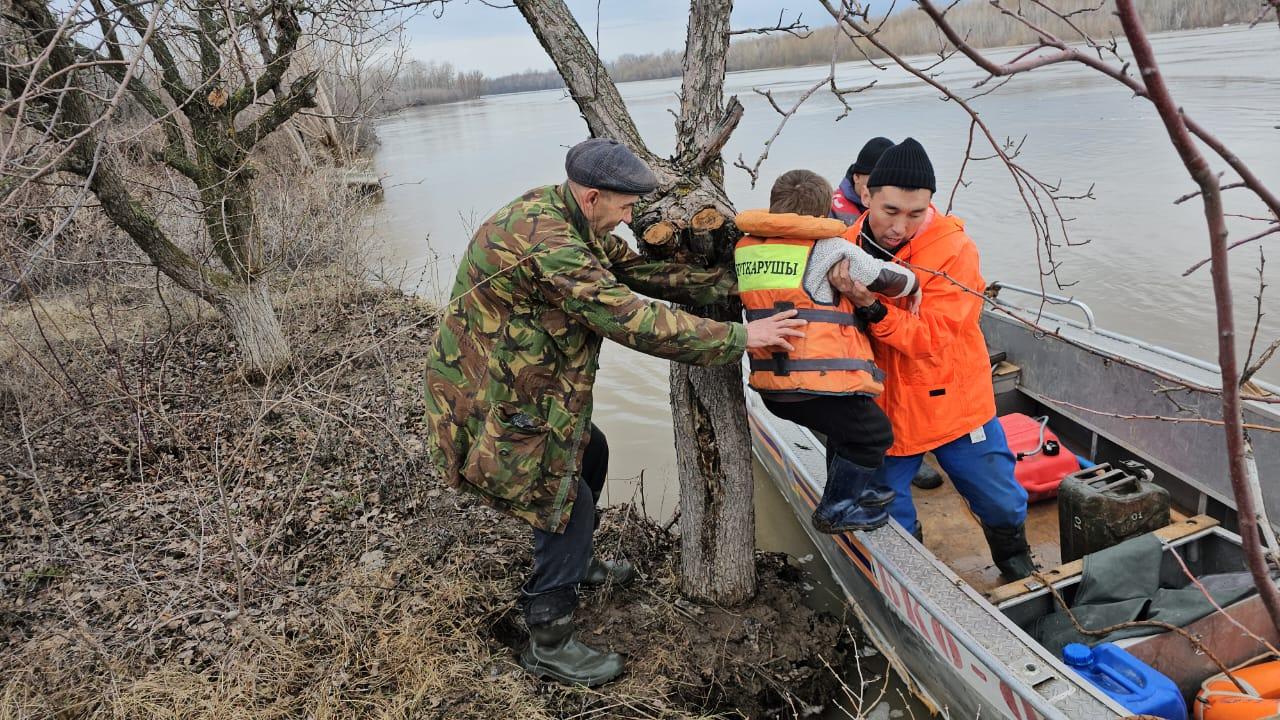The number of evacuees from flooded areas in Kazakhstan has reached 97,852 people, including about 32,856 children since March 27.
The floods began in the western, northern and eastern regions of Kazakhstan due to rain and heavy snowmelt. A total of 68 settlements are unreachable by land due to the destruction of 103 roads and nine bridges. In addition, 107 roads leading to those residential areas are flooded, Tengrinews.kz reported on April 11, citing the latest update by the Emergencies Ministry.
The state of emergency remains in 33 localities in eight regions of Kazakhstan, namely Aktobe, Kostanay, West Kazakhstan, Ulytau, Akmola, Karaganda, Atyrau and North Kazakhstan regions. According to a senior officer of the country’s Emergencies Ministry, "over 27,000 people, about 3,000 units of equipment and 15 aircraft are involved in rescue operations".
On 10 April, the Kazakh authorities decided to tap into the country's state reserve to provide the necessary equipment and materials urgently needed in rescue operations. Meanwhile, Kazakhstan's Agriculture Ministry said that over 8,000 head of livestock have been killed in the floods over the last two weeks.
In a video address on April 6, Kazakh President Kassym-Jomart Tokayev called on the nation to unite in the face of the large-scale flooding, saying that “perhaps this is the largest disaster in the past 80 plus years in terms of its scale and consequences".
He promised that the government would provide "financial and other necessary assistance" to compensate for all material losses of people affected by the floods.
Spokeswoman for Kazakhstan’s Ministry of Water Resources and Irrigation, Mouldir Abdualiyeva, said on April 8 that many of the major dams in several regions of Kazakhstan are either almost full or filled to capacity, and added that more flooding is expected in two weeks along the River Ural (the Zhayyk River in Kazakhstan) flowing from Russia.
"According to operational data from Russia, the discharge from the Iriklinsky hydroelectric facility remains at the previous day's level - 1,680 cubic metres per second. This water can reach the borders of Kazakhstan in 15-20 days. Therefore, in order to prevent flooding, the ministry and employees of the governor's offices of West Kazakhstan and Atyrau regions are clearing waterways of ice cover and eliminating congestion," the official noted.
Melting snow from the Ural Mountains in Russia also caused seasonal floods, triggering evacuations throughout Orenburg Region that borders Kazakhstan in the south. The Ural River, Europe's third-longest, burst through a dam embankment in the Russian city of Orsk at the weekend. Parts of the Urals, western Siberia and the Volga basin in Russia have been hit by floods. More than 10,000 homes are under water, according to the emergency ministry.
In a phone conversation on April 9, the Kazakh president and his Russian counterpart Vladimir Putin discussed stepping up efforts aimed at tackling the "difficult" flood situation in border areas. They noted the close cooperation between the two countries' relevant agencies and services, which are jointly monitoring and forecasting the situation, and developing and implementing coordinated response measures.
Kazakhstan's Ministry of Water Resources and Irrigation has denied Russian Presidential Representative for Ural Federal District Vladimir Yakushev's claim that Kazakhstan's water discharge was to blame for the flooding in Russia's border regions.
"Water along the River Tobol comes from Russia. And, accordingly, decisions on water discharges are made based on the flows that come from the Russian side. Therefore, it is incorrect to say that Kazakhstan is influencing the floods in Russia. This is not true," KazTAG quoted the Kazakh ministry as saying on April 10.
Earlier, Yakushev reportedly suggested that a more consistent release of water from Kazakh reservoirs could help prevent flooding in Russia's Kurgan and Tyumen regions bordering Kazakhstan.







 Kyrgyzstan has joined the extensive reconstruction efforts in the Karabakh region of Azerbaijan, after a series of mega initiatives were launched b...
Kyrgyzstan has joined the extensive reconstruction efforts in the Karabakh region of Azerbaijan, after a series of mega initiatives were launched b...
 President Ilham Aliyev shed light on the evolving contours of the peace process with Armenia during an international conference in Baku this week. ...
President Ilham Aliyev shed light on the evolving contours of the peace process with Armenia during an international conference in Baku this week. ...
 Azerbaijan and Armenia started the process of demarcation of their border on Tuesday, with the installation of the first border markers based on ge...
Azerbaijan and Armenia started the process of demarcation of their border on Tuesday, with the installation of the first border markers based on ge...
 Iranian President Ebrahim Raisi expressed Tehran’s readiness to participate in significant development projects in Sri Lanka during the inauguratio...
Iranian President Ebrahim Raisi expressed Tehran’s readiness to participate in significant development projects in Sri Lanka during the inauguratio...
 Iran and Pakistan have signed eight cooperation documents in various fields, and agreed to strengthen ties to fight terrorism in the region.
Iran and Pakistan have signed eight cooperation documents in various fields, and agreed to strengthen ties to fight terrorism in the region.



